Unit 1 Nature in the balance Grammar and usage(共32张PPT)
文档属性
| 名称 | Unit 1 Nature in the balance Grammar and usage(共32张PPT) |
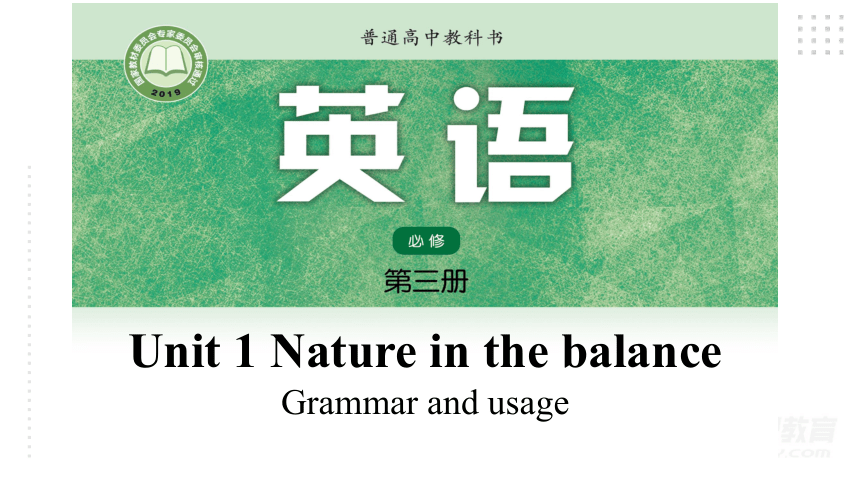
|
|
| 格式 | zip | ||
| 文件大小 | 16.0MB | ||
| 资源类型 | 试卷 | ||
| 版本资源 | 牛津译林版(2019) | ||
| 科目 | 英语 | ||
| 更新时间 | 2021-04-26 00:00:00 | ||
图片预览

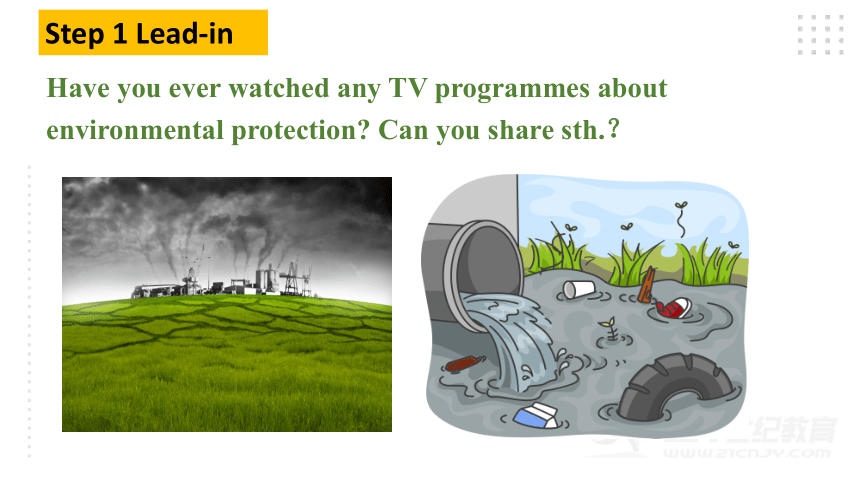
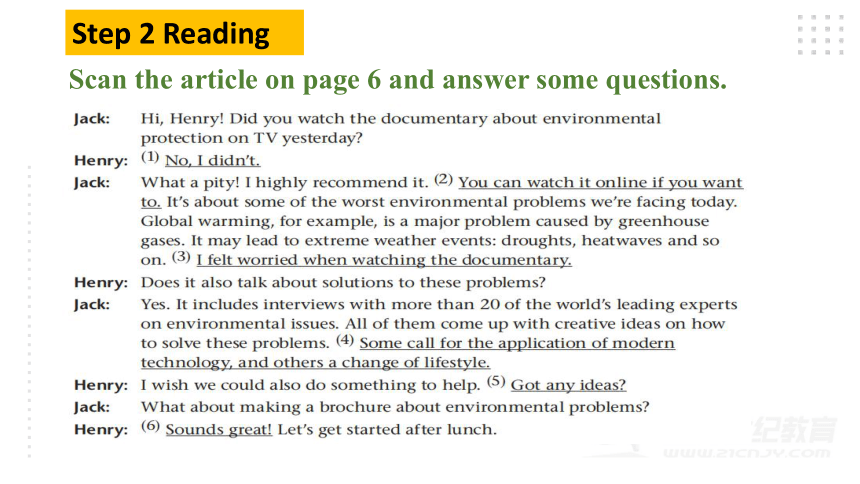
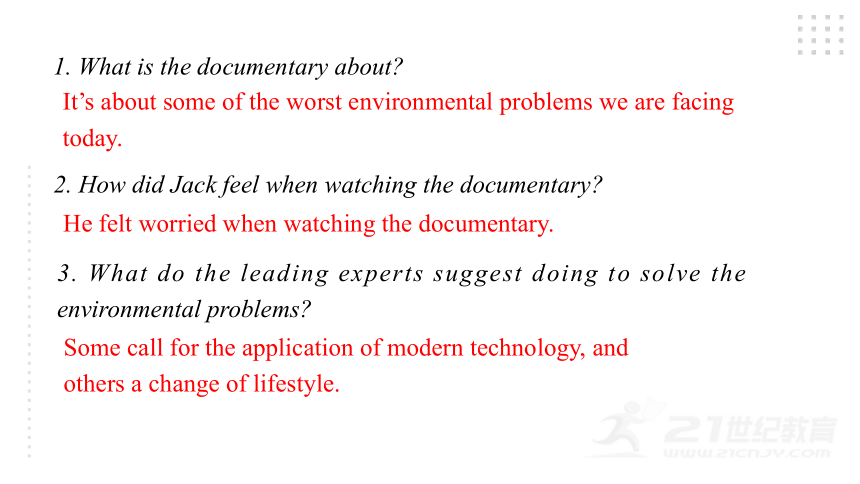
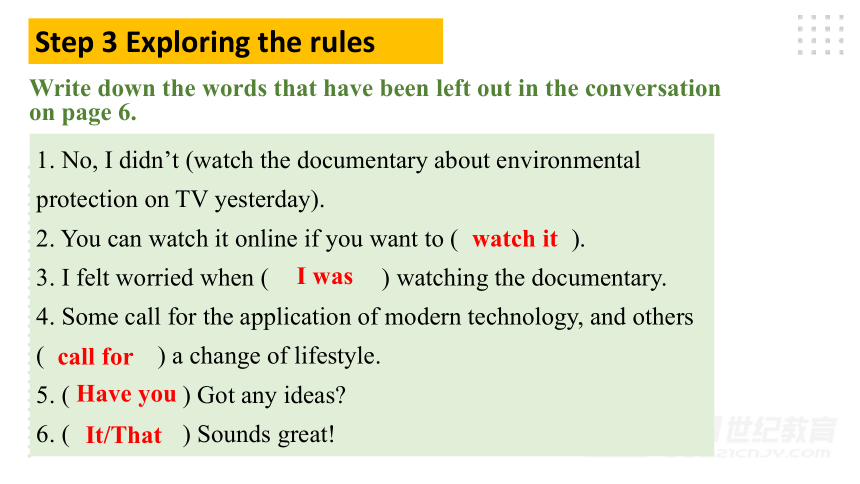
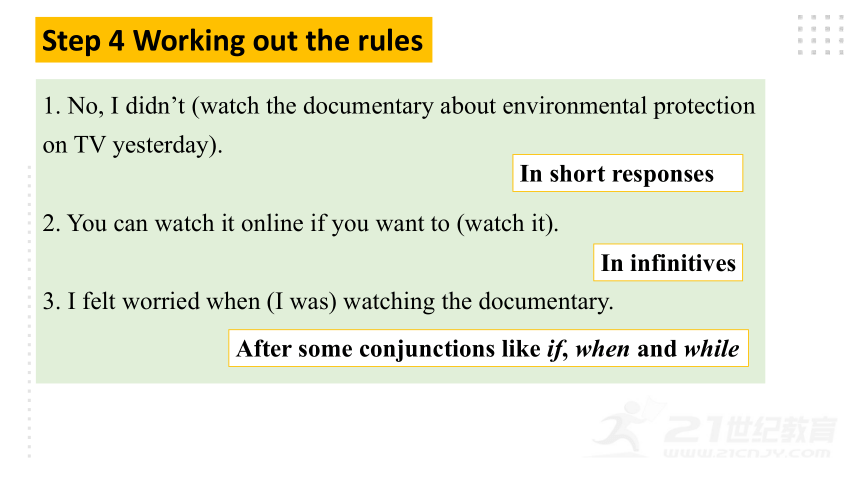
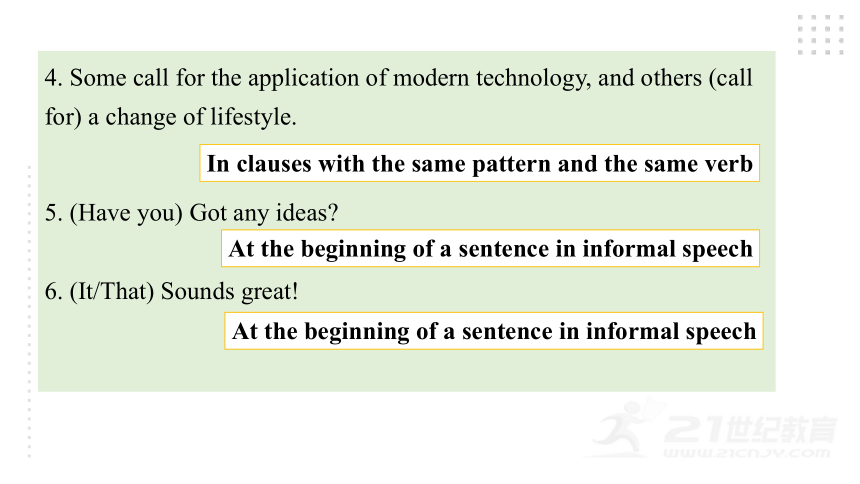

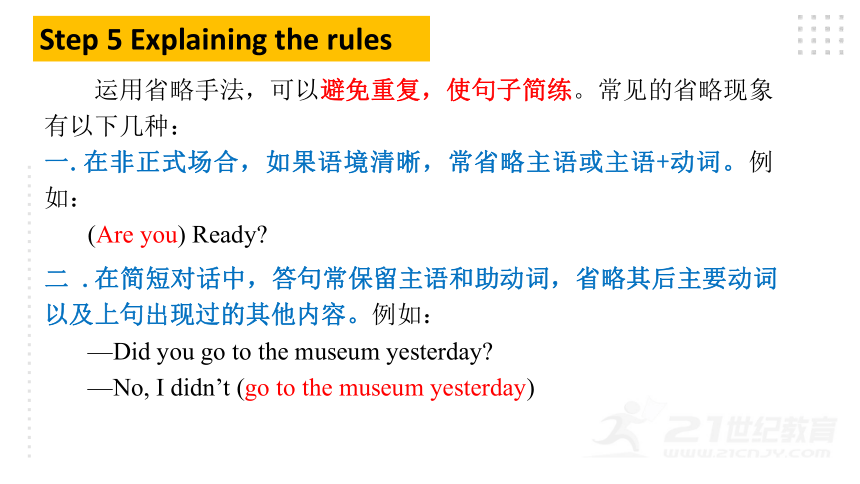
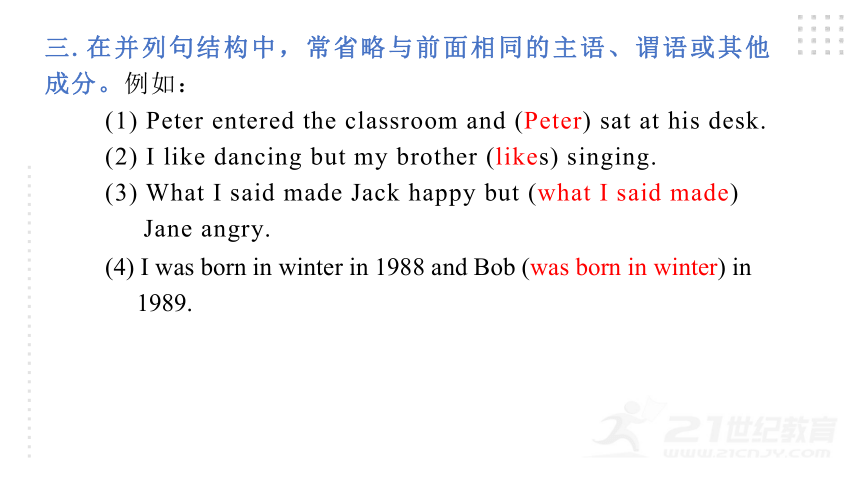
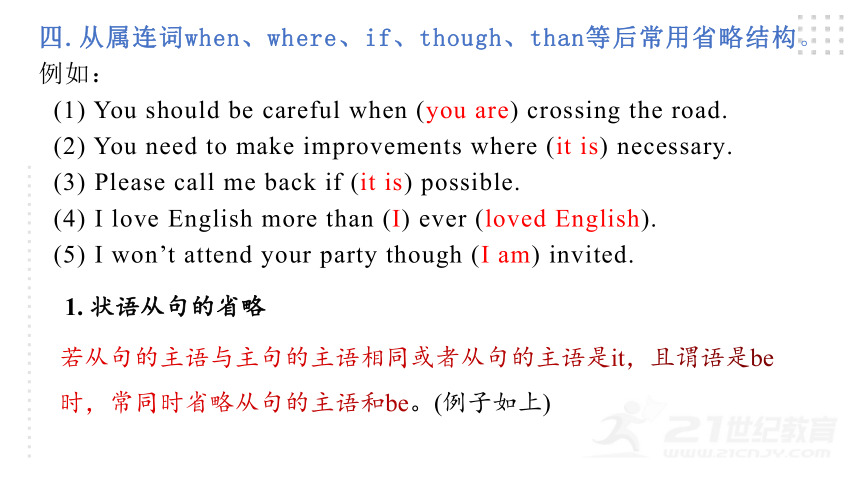
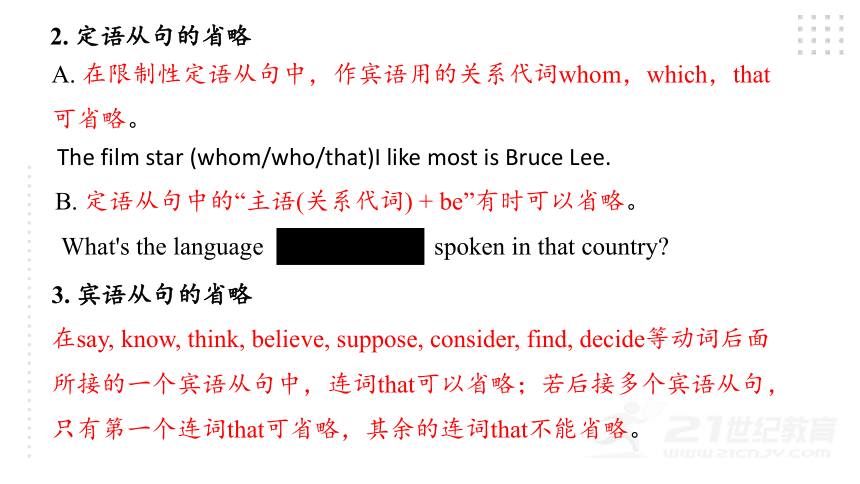
文档简介
(共33张PPT)
Lead
in
Unit
1
Nature
in
the
balance
Grammar
and
usage
Presentation
Have
you
ever
watched
any
TV
programmes
about
environmental
protection?
Can
you
share
sth.?
Step
1
Lead-in
Scan
the
article
on
page
6
and
answer
some
questions.
Step
2
Reading
Presentation
1.
What
is
the
documentary
about?
It’s
about
some
of
the
worst
environmental
problems
we
are
facing
today.
2.
How
did
Jack
feel
when
watching
the
documentary?
He
felt
worried
when
watching
the
documentary.
3.
What
do
the
leading
experts
suggest
doing
to
solve
the
environmental
problems?
Some
call
for
the
application
of
modern
technology,
and
others
a
change
of
lifestyle.
Language
points
Step
3
Exploring
the
rules
Write
down
the
words
that
have
been
left
out
in
the
conversation
on
page
6.
1.
No,
I
didn’t
(watch
the
documentary
about
environmental
protection
on
TV
yesterday).
2.
You
can
watch
it
online
if
you
want
to
(
).
3.
I
felt
worried
when
(
)
watching
the
documentary.
4.
Some
call
for
the
application
of
modern
technology,
and
others
(
)
a
change
of
lifestyle.
5.
(
)
Got
any
ideas?
6.
(
)
Sounds
great!
watch
it
I
was
call
for
Have
you
It/That
1.
No,
I
didn’t
(watch
the
documentary
about
environmental
protection
on
TV
yesterday).
2.
You
can
watch
it
online
if
you
want
to
(watch
it).
3.
I
felt
worried
when
(I
was)
watching
the
documentary.
In
short
responses
In
infinitives
After
some
conjunctions
like
if,
when
and
while
Step
4
Working
out
the
rules
4.
Some
call
for
the
application
of
modern
technology,
and
others
(call
for)
a
change
of
lifestyle.
5.
(Have
you)
Got
any
ideas?
6.
(It/That)
Sounds
great!
In
clauses
with
the
same
pattern
and
the
same
verb
At
the
beginning
of
a
sentence
in
informal
speech
At
the
beginning
of
a
sentence
in
informal
speech
We
sometimes
use
ellipisis
to
avoid
(1)
__________
(stressing/repeating)
one
or
more
words
when
the
meaning
is
clear.
We
can
use
ellipsis:
in
short
responses;
in
infinitives;
after
some
conjunctions
like
if,
when
and
while;
in
clauses
with
the
same
pattern
and
the
same
verb;
at
the
beginning
of
a
sentence
in
(2)__________
(informal/formal)
speech.
repeating
informal
Step
4
Working
out
the
rules
Step
5
Explaining
the
rules
运用省略手法,可以避免重复,使句子简练。常见的省略现象有以下几种:
一.在非正式场合,如果语境清晰,常省略主语或主语+动词。例如:
(Are
you)
Ready?
二
.在简短对话中,答句常保留主语和助动词,省略其后主要动词以及上句出现过的其他内容。例如:
—Did
you
go
to
the
museum
yesterday?
—No,
I
didn’t
(go
to
the
museum
yesterday)
三.在并列句结构中,常省略与前面相同的主语、谓语或其他成分。例如:
(1)
Peter
entered
the
classroom
and
(Peter)
sat
at
his
desk.
(2)
I
like
dancing
but
my
brother
(likes)
singing.
(3)
What
I
said
made
Jack
happy
but
(what
I
said
made)
Jane
angry.
(4)
I
was
born
in
winter
in
1988
and
Bob
(was
born
in
winter)
in
1989.
四.从属连词when、where、if、though、than等后常用省略结构。例如:
(1)
You
should
be
careful
when
(you
are)
crossing
the
road.
(2)
You
need
to
make
improvements
where
(it
is)
necessary.
(3)
Please
call
me
back
if
(it
is)
possible.
(4)
I
love
English
more
than
(I)
ever
(loved
English).
(5)
I
won’t
attend
your
party
though
(I
am)
invited.
1.
状语从句的省略
2.
定语从句的省略
A.
在限制性定语从句中,作宾语用的关系代词whom,which,that可省略。
B.
定语从句中的“主语(关系代词)
+
be”有时可以省略。
The
film
star
(whom/who/that)I
like
most
is
Bruce
Lee.
What's
the
language
(that/which
is)
spoken
in
that
country?
3.
宾语从句的省略
在say,
know,
think,
believe,
suppose,
consider,
find,
decide等动词后面所接的一个宾语从句中,连词that可以省略;若后接多个宾语从句,只有第一个连词that可省略,其余的连词that不能省略。
1.
There
is
no
reason
to
suppose
(that)
she's
lying.
2.
Our
Chinese
teacher
said
(that)
the
text
was
very
importan
and
that
we
should
memomize
it.
五.不定式作宾语或宾语补足语时,常省略to后面的内容。例如:
(1)
You
don’t
have
to
do
it
if
you
don’t
want
to
(do
it).
(2)
You’d
better
not
take
medicine
unless
your
doctor
told
you
to
(take
medicine).
如果不定式后接be动词或动词的完成式,省略句中往往保留be或have。例如:
(1)
I
am
busier
now
than
I
used
to
be
(busy).
(2)
—Has
Mike
finished
his
project?
—He
seems
to
have
(finished
his
project).
六、不定式符号可省略的情况
1.
The
most
important
thing
I
should
do
is
(to)
give
you
some
advice
on
how
to
learn
a
foreign
language.
2.
I
don't
want
to
do
anything
except/but
help
you.
B.在see,
look
at,
hear,
listen
to,
watch,
notice,observe,feel,have,make,let等词后作宾语补足语时,须省略不定式符号to
。
A.前有实意动词do的各种形式
,作表语的不定式和介词but/except后的不定式要省略to。
Yesterday
I
listened
to
Mary
speak
movingly
about
her
love
story
once
again.
Step
6
Practice
Find
the
mistakes
and
rewrite
the
sentences
using
ellipsis.
1.
I
cannot
watch
the
documentary
this
weekend,
though
I
would
like.
We
cannot
leave
out
to
in
infinitives
when
using
ellipsis.
I
cannot
watch
the
documentary
this
weekend,
though
I
would
like
to.
Individual
work
2.
Cows
live
on
land,
and
fish
the
water.
Different
prepositions
are
used
and
they
can’t
be
left
out.
Cows
live
on
land,
and
fish
in
the
water.
3.
The
Amazon
rainforest
is
smaller
now
than
was
50
years
ago.
When
using
ellipsis
in
clauses
with
the
same
pattern,
the
subject
and
the
verb
should
be
left
out
altogether.
The
Amazon
rainforest
is
smaller
now
than
50
years
ago.
4.
He
had
planned
to
borrow
a
book
on
environmental
protection,
but
he
didn’t
do.
When
using
ellipsis
in
compound
sentences,
the
part
behind
the
auxiliary
verb
should
be
left
out
altogether.
He
had
planned
to
borrow
a
book
on
environmental
protection,
but
he
didn’t.
5.
When
taking
photos
of
wildlife,
every
effort
should
be
made
to
ensure
that
we
keep
away
from
the
animals.
When
using
ellipsis
in
adverbial
clauses,
we
need
to
make
sure
that
the
subject
of
the
main
clause
is
the
same
as
the
subject
of
the
subordinate
clause.
When
taking
photos
of
wildlife,
we
should
make
every
effort
to
ensure
that
we
keep
away
from
the
animals.
Jack
is
sharing
with
his
classmates
his
experience
of
taking
part
in
a
forest
clean-up
activity.
Use
ellipsis
where
necessary.
Put
brackets
around
the
word(s)
that
can
be
left
out.
Step
7
Group
work
At
first
I
didn’t
want
to
(take
part
in
the
forest
clean-up
activity),
but
then
I
thought,
“What
if
nobody
goes?”
There
was
a
“No
littering
(is
allowed
here)”
sign
at
the
entrance
to
the
forest,
but
that
didn’t
stop
people
from
throwing
their
rubbish
on
the
ground.
In
infinitives
In
informal
sentences
Joe
divided
us
into
two
groups:
one
group
cleaned
up
the
north
side
of
the
forest,
and
the
other
(group)
(cleaned
up)
the
south
side
(of
the
forest).
We
worked
for
several
hours
and
(we)
were
happy
to
see
(that)
the
forest
looked
cleaner
than
(it
had
looked)
before.
You
can
find
Joe
and
sign
up
if
(you’re)
willing
to
help.
In
clauses
with
the
same
pattern
and
the
same
verb
In
compound
sentences
with
the
same
subject;
that
in
object
clauses;
in
clauses
with
the
same
subject
and
the
same
verb
After
some
conjunctions
like
if,
when
and
while
Fill
in
the
blanks
by
using
ellipsis.
1.
Misunderstandings
resulting
from
lack
of
social
communication,
if
not
(handle)
properly,
may
lead
to
serious
problems.
2.
I’d
like
to
invite
you
to
the
coming
party,
which
will
take
place
on
the
second
floor
of
the
dining
hall
as
(expect)
3.
You
may
have
finished
your
homework.
If
,
you
can
go
on
to
play
football.
handled
expected
so
Step
8
Consolidation
Consolidation
1
4.
—Is
he
coming
back
tonight?
—I
think
.
5.
When
(arrive),
send
me
a
telegram.
6.
Don’t
come
in
until
(ask)
to.
7.
You
should
let
us
know
the
result
.(尽快)
8.
There
are
few
people
nowadays,
(如果有),
who
remember
him.
9.
The
engineers
are
also
trying
to
develop
an
on
and
off
“switch”
where
the
glow
would
fade
when
_______(expose)
to
daylight.
asked
as
soon
as
possible
if
any
so
arriving
exposed
1._____,
I
will
help
you
with
your
work.
A.If
I
am
possible
B.
If
it
possible
C.
If
possible
D.
Possible
2.—How
many
poor
counties
will
there
be
in
our
province
by
2025?
—There
will
be
only
a
few,
if
_____.
A.much
B.
some
C.
any
D.
many
Consolidation
2
3.—Why
didn’t
you
come
to
Mike’s
birthday
party
yesterday
?
—Well,
I_____,
but
I
forgot
it.
A.should
B.
must
C.
should
have
D.
must
have
4.—I’d
like
to
have
a
piece
of
bread
and
two
eggs.
—Anything
___?
A.following
B.follows
C.to
follow
D.to
be
followed
5.
The
driver
wanted
to
park
his
car
near
the
roadside
but
was
asked
by
the
police
________.
A.
not
to
do
B.
not
to
C.
not
do
D.
do
not
Consolidation
3
用省略的方式改写下列句子
1.Whenever
it
is
possible,
the
young
boy
will
come
to
my
help.
________________________________________________.
2.Don’t
go
till
the
teacher
tells
you
to
go.
________________________________________________.
3.John
worked
hard
but
his
deskmate
did
not
work
hard.
________________________________________________.
4.When
you
are
crossing
the
street,
you
should
be
careful.
________________________________________________.
4.
When
crossing
the
street,you
should
be
careful.
1.
Whenever
possible,
the
young
boy
will
come
to
my
help.
2.
Don’t
go
till
the
teacher
tells
you
to.
3.
John
worked
hard
but
his
deskmate
didn’t
Many
westerners
who
come
to
China
cook
much
less
________
in
their
own
countries
once
they
realize
how
cheap
it
can
be
to
eat
out.
(2018浙江,
语法填空)
China’s
approach
to
protecting
its
environment
while
________
(feed)
its
citizens
“offers
useful
lessons
for
agriculture
and
food
policymakers
worldwide,”
says
the
bank’s
Juergen
Voegele.
(2018全国II,
语法填空)
than
feeding
Consolidation
4
“Well,
I
don’t
know
you
all
but
I
will
get
there
to
take
pictures
with
the
baby,”
replied
Dennis
before
_______
(ask)
which
room
the
new
parents
were
in.
(2018全国III,
完形填空)
When
________
(combine)
with
berries
or
slices
of
other
fruits,
frozen
bananas
make
an
excellent
base
for
thick,
cooling
fruit
shakes
and
low
fat
“ice
cream”.
(2018全国II,
阅读理解B)
asking
combined
Freddy
was
an
average
student,
________
not
an
average
person.
(2017全国II,
完形填空)
The
likables’
plays-well-with-others
qualities
strengthen
schoolyard
friendships,
jump-start
interpersonal
skills
and,
when
_______
(tap)
early,
are
employed
ever
after
in
life
and
work.
(2019全国I,
阅读理解D)
but
tapped
“I
figured
whoever
lost
the
dog
was
probably
just
as
close
to
it
as
I
am
_______
my
dogs,”
says
Ehlers.
(2019全国II,
完形填空)
One
group
was
asked
to
seek
out
an
interaction
with
its
waiter;
the
other,
________
(speak)
only
when
necessary.
(2018全国II,
阅读理解D)
to
to
speak
Draw
or
find
more
pictures
about
environment
protection
and
describe
the
pictures
using
ellipsis.
Homework
https://www.21cnjy.com/help/help_extract.php
Lead
in
Unit
1
Nature
in
the
balance
Grammar
and
usage
Presentation
Have
you
ever
watched
any
TV
programmes
about
environmental
protection?
Can
you
share
sth.?
Step
1
Lead-in
Scan
the
article
on
page
6
and
answer
some
questions.
Step
2
Reading
Presentation
1.
What
is
the
documentary
about?
It’s
about
some
of
the
worst
environmental
problems
we
are
facing
today.
2.
How
did
Jack
feel
when
watching
the
documentary?
He
felt
worried
when
watching
the
documentary.
3.
What
do
the
leading
experts
suggest
doing
to
solve
the
environmental
problems?
Some
call
for
the
application
of
modern
technology,
and
others
a
change
of
lifestyle.
Language
points
Step
3
Exploring
the
rules
Write
down
the
words
that
have
been
left
out
in
the
conversation
on
page
6.
1.
No,
I
didn’t
(watch
the
documentary
about
environmental
protection
on
TV
yesterday).
2.
You
can
watch
it
online
if
you
want
to
(
).
3.
I
felt
worried
when
(
)
watching
the
documentary.
4.
Some
call
for
the
application
of
modern
technology,
and
others
(
)
a
change
of
lifestyle.
5.
(
)
Got
any
ideas?
6.
(
)
Sounds
great!
watch
it
I
was
call
for
Have
you
It/That
1.
No,
I
didn’t
(watch
the
documentary
about
environmental
protection
on
TV
yesterday).
2.
You
can
watch
it
online
if
you
want
to
(watch
it).
3.
I
felt
worried
when
(I
was)
watching
the
documentary.
In
short
responses
In
infinitives
After
some
conjunctions
like
if,
when
and
while
Step
4
Working
out
the
rules
4.
Some
call
for
the
application
of
modern
technology,
and
others
(call
for)
a
change
of
lifestyle.
5.
(Have
you)
Got
any
ideas?
6.
(It/That)
Sounds
great!
In
clauses
with
the
same
pattern
and
the
same
verb
At
the
beginning
of
a
sentence
in
informal
speech
At
the
beginning
of
a
sentence
in
informal
speech
We
sometimes
use
ellipisis
to
avoid
(1)
__________
(stressing/repeating)
one
or
more
words
when
the
meaning
is
clear.
We
can
use
ellipsis:
in
short
responses;
in
infinitives;
after
some
conjunctions
like
if,
when
and
while;
in
clauses
with
the
same
pattern
and
the
same
verb;
at
the
beginning
of
a
sentence
in
(2)__________
(informal/formal)
speech.
repeating
informal
Step
4
Working
out
the
rules
Step
5
Explaining
the
rules
运用省略手法,可以避免重复,使句子简练。常见的省略现象有以下几种:
一.在非正式场合,如果语境清晰,常省略主语或主语+动词。例如:
(Are
you)
Ready?
二
.在简短对话中,答句常保留主语和助动词,省略其后主要动词以及上句出现过的其他内容。例如:
—Did
you
go
to
the
museum
yesterday?
—No,
I
didn’t
(go
to
the
museum
yesterday)
三.在并列句结构中,常省略与前面相同的主语、谓语或其他成分。例如:
(1)
Peter
entered
the
classroom
and
(Peter)
sat
at
his
desk.
(2)
I
like
dancing
but
my
brother
(likes)
singing.
(3)
What
I
said
made
Jack
happy
but
(what
I
said
made)
Jane
angry.
(4)
I
was
born
in
winter
in
1988
and
Bob
(was
born
in
winter)
in
1989.
四.从属连词when、where、if、though、than等后常用省略结构。例如:
(1)
You
should
be
careful
when
(you
are)
crossing
the
road.
(2)
You
need
to
make
improvements
where
(it
is)
necessary.
(3)
Please
call
me
back
if
(it
is)
possible.
(4)
I
love
English
more
than
(I)
ever
(loved
English).
(5)
I
won’t
attend
your
party
though
(I
am)
invited.
1.
状语从句的省略
2.
定语从句的省略
A.
在限制性定语从句中,作宾语用的关系代词whom,which,that可省略。
B.
定语从句中的“主语(关系代词)
+
be”有时可以省略。
The
film
star
(whom/who/that)I
like
most
is
Bruce
Lee.
What's
the
language
(that/which
is)
spoken
in
that
country?
3.
宾语从句的省略
在say,
know,
think,
believe,
suppose,
consider,
find,
decide等动词后面所接的一个宾语从句中,连词that可以省略;若后接多个宾语从句,只有第一个连词that可省略,其余的连词that不能省略。
1.
There
is
no
reason
to
suppose
(that)
she's
lying.
2.
Our
Chinese
teacher
said
(that)
the
text
was
very
importan
and
that
we
should
memomize
it.
五.不定式作宾语或宾语补足语时,常省略to后面的内容。例如:
(1)
You
don’t
have
to
do
it
if
you
don’t
want
to
(do
it).
(2)
You’d
better
not
take
medicine
unless
your
doctor
told
you
to
(take
medicine).
如果不定式后接be动词或动词的完成式,省略句中往往保留be或have。例如:
(1)
I
am
busier
now
than
I
used
to
be
(busy).
(2)
—Has
Mike
finished
his
project?
—He
seems
to
have
(finished
his
project).
六、不定式符号可省略的情况
1.
The
most
important
thing
I
should
do
is
(to)
give
you
some
advice
on
how
to
learn
a
foreign
language.
2.
I
don't
want
to
do
anything
except/but
help
you.
B.在see,
look
at,
hear,
listen
to,
watch,
notice,observe,feel,have,make,let等词后作宾语补足语时,须省略不定式符号to
。
A.前有实意动词do的各种形式
,作表语的不定式和介词but/except后的不定式要省略to。
Yesterday
I
listened
to
Mary
speak
movingly
about
her
love
story
once
again.
Step
6
Practice
Find
the
mistakes
and
rewrite
the
sentences
using
ellipsis.
1.
I
cannot
watch
the
documentary
this
weekend,
though
I
would
like.
We
cannot
leave
out
to
in
infinitives
when
using
ellipsis.
I
cannot
watch
the
documentary
this
weekend,
though
I
would
like
to.
Individual
work
2.
Cows
live
on
land,
and
fish
the
water.
Different
prepositions
are
used
and
they
can’t
be
left
out.
Cows
live
on
land,
and
fish
in
the
water.
3.
The
Amazon
rainforest
is
smaller
now
than
was
50
years
ago.
When
using
ellipsis
in
clauses
with
the
same
pattern,
the
subject
and
the
verb
should
be
left
out
altogether.
The
Amazon
rainforest
is
smaller
now
than
50
years
ago.
4.
He
had
planned
to
borrow
a
book
on
environmental
protection,
but
he
didn’t
do.
When
using
ellipsis
in
compound
sentences,
the
part
behind
the
auxiliary
verb
should
be
left
out
altogether.
He
had
planned
to
borrow
a
book
on
environmental
protection,
but
he
didn’t.
5.
When
taking
photos
of
wildlife,
every
effort
should
be
made
to
ensure
that
we
keep
away
from
the
animals.
When
using
ellipsis
in
adverbial
clauses,
we
need
to
make
sure
that
the
subject
of
the
main
clause
is
the
same
as
the
subject
of
the
subordinate
clause.
When
taking
photos
of
wildlife,
we
should
make
every
effort
to
ensure
that
we
keep
away
from
the
animals.
Jack
is
sharing
with
his
classmates
his
experience
of
taking
part
in
a
forest
clean-up
activity.
Use
ellipsis
where
necessary.
Put
brackets
around
the
word(s)
that
can
be
left
out.
Step
7
Group
work
At
first
I
didn’t
want
to
(take
part
in
the
forest
clean-up
activity),
but
then
I
thought,
“What
if
nobody
goes?”
There
was
a
“No
littering
(is
allowed
here)”
sign
at
the
entrance
to
the
forest,
but
that
didn’t
stop
people
from
throwing
their
rubbish
on
the
ground.
In
infinitives
In
informal
sentences
Joe
divided
us
into
two
groups:
one
group
cleaned
up
the
north
side
of
the
forest,
and
the
other
(group)
(cleaned
up)
the
south
side
(of
the
forest).
We
worked
for
several
hours
and
(we)
were
happy
to
see
(that)
the
forest
looked
cleaner
than
(it
had
looked)
before.
You
can
find
Joe
and
sign
up
if
(you’re)
willing
to
help.
In
clauses
with
the
same
pattern
and
the
same
verb
In
compound
sentences
with
the
same
subject;
that
in
object
clauses;
in
clauses
with
the
same
subject
and
the
same
verb
After
some
conjunctions
like
if,
when
and
while
Fill
in
the
blanks
by
using
ellipsis.
1.
Misunderstandings
resulting
from
lack
of
social
communication,
if
not
(handle)
properly,
may
lead
to
serious
problems.
2.
I’d
like
to
invite
you
to
the
coming
party,
which
will
take
place
on
the
second
floor
of
the
dining
hall
as
(expect)
3.
You
may
have
finished
your
homework.
If
,
you
can
go
on
to
play
football.
handled
expected
so
Step
8
Consolidation
Consolidation
1
4.
—Is
he
coming
back
tonight?
—I
think
.
5.
When
(arrive),
send
me
a
telegram.
6.
Don’t
come
in
until
(ask)
to.
7.
You
should
let
us
know
the
result
.(尽快)
8.
There
are
few
people
nowadays,
(如果有),
who
remember
him.
9.
The
engineers
are
also
trying
to
develop
an
on
and
off
“switch”
where
the
glow
would
fade
when
_______(expose)
to
daylight.
asked
as
soon
as
possible
if
any
so
arriving
exposed
1._____,
I
will
help
you
with
your
work.
A.If
I
am
possible
B.
If
it
possible
C.
If
possible
D.
Possible
2.—How
many
poor
counties
will
there
be
in
our
province
by
2025?
—There
will
be
only
a
few,
if
_____.
A.much
B.
some
C.
any
D.
many
Consolidation
2
3.—Why
didn’t
you
come
to
Mike’s
birthday
party
yesterday
?
—Well,
I_____,
but
I
forgot
it.
A.should
B.
must
C.
should
have
D.
must
have
4.—I’d
like
to
have
a
piece
of
bread
and
two
eggs.
—Anything
___?
A.following
B.follows
C.to
follow
D.to
be
followed
5.
The
driver
wanted
to
park
his
car
near
the
roadside
but
was
asked
by
the
police
________.
A.
not
to
do
B.
not
to
C.
not
do
D.
do
not
Consolidation
3
用省略的方式改写下列句子
1.Whenever
it
is
possible,
the
young
boy
will
come
to
my
help.
________________________________________________.
2.Don’t
go
till
the
teacher
tells
you
to
go.
________________________________________________.
3.John
worked
hard
but
his
deskmate
did
not
work
hard.
________________________________________________.
4.When
you
are
crossing
the
street,
you
should
be
careful.
________________________________________________.
4.
When
crossing
the
street,you
should
be
careful.
1.
Whenever
possible,
the
young
boy
will
come
to
my
help.
2.
Don’t
go
till
the
teacher
tells
you
to.
3.
John
worked
hard
but
his
deskmate
didn’t
Many
westerners
who
come
to
China
cook
much
less
________
in
their
own
countries
once
they
realize
how
cheap
it
can
be
to
eat
out.
(2018浙江,
语法填空)
China’s
approach
to
protecting
its
environment
while
________
(feed)
its
citizens
“offers
useful
lessons
for
agriculture
and
food
policymakers
worldwide,”
says
the
bank’s
Juergen
Voegele.
(2018全国II,
语法填空)
than
feeding
Consolidation
4
“Well,
I
don’t
know
you
all
but
I
will
get
there
to
take
pictures
with
the
baby,”
replied
Dennis
before
_______
(ask)
which
room
the
new
parents
were
in.
(2018全国III,
完形填空)
When
________
(combine)
with
berries
or
slices
of
other
fruits,
frozen
bananas
make
an
excellent
base
for
thick,
cooling
fruit
shakes
and
low
fat
“ice
cream”.
(2018全国II,
阅读理解B)
asking
combined
Freddy
was
an
average
student,
________
not
an
average
person.
(2017全国II,
完形填空)
The
likables’
plays-well-with-others
qualities
strengthen
schoolyard
friendships,
jump-start
interpersonal
skills
and,
when
_______
(tap)
early,
are
employed
ever
after
in
life
and
work.
(2019全国I,
阅读理解D)
but
tapped
“I
figured
whoever
lost
the
dog
was
probably
just
as
close
to
it
as
I
am
_______
my
dogs,”
says
Ehlers.
(2019全国II,
完形填空)
One
group
was
asked
to
seek
out
an
interaction
with
its
waiter;
the
other,
________
(speak)
only
when
necessary.
(2018全国II,
阅读理解D)
to
to
speak
Draw
or
find
more
pictures
about
environment
protection
and
describe
the
pictures
using
ellipsis.
Homework
https://www.21cnjy.com/help/help_extract.php
同课章节目录
- Unit 1 Nature in the balance
- Welcome to the unit
- Reading
- Grammar and usage
- Integrated skills
- Extended reading
- Project
- Unit 2 Natural disasters
- Welcome to the unit
- Reading
- Grammar and usage
- Integrated skills
- Extended reading
- Project
- Unit 3 The world online
- Welcome to the unit
- Reading
- Grammar and usage
- Integrated skills
- Extended reading
- Project
- Unit 4 Scientists who changed the world
- Welcome to the unit
- Reading
- Grammar and usage
- Integrated skills
- Extended reading
- Project
